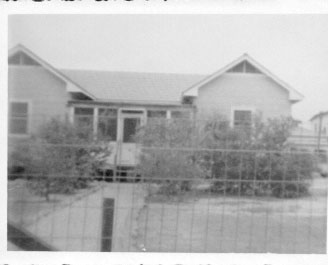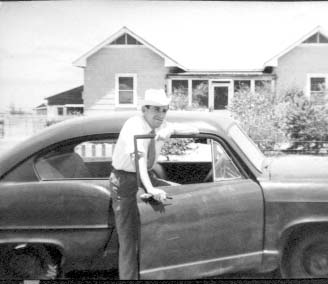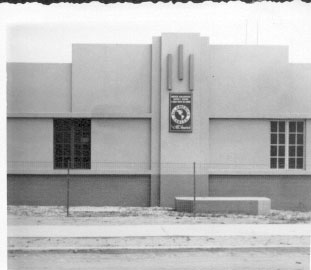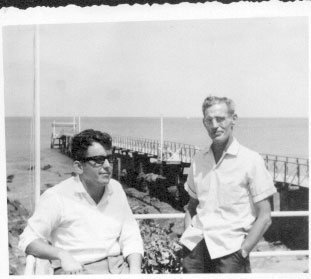Latin America 1950s 4 - CCC Wiki (original) (raw)
**LAST UPDATE JUNE 3 2013: Part 4 - Additional name added to Maurice Hale's Group Photo of Lima Staff (John O'Neil)**
Contents
From Maurice Hale
So now it is time for me to write something about our early days in Latin America. I have been putting it off and putting it off because it is difficult to know where to start and what to include or leave out. This is an attempt to make an unbelievable story believable and to try to convey some of the excitement of those youthful days, when the world was our oyster, and when, with the benefit of 40 years on, we took so many things for granted.
I had to leave school at 15 with no qualifications because there were financial problems at home. Someone had to go out and earn a living and that was me. Our family was friendly with Nobby Clarke's family and he, being a long-serving CCC man, got me into the London office as a Pick Up (an indoor messenger boy). Which is something for which I will be eternally grateful because it set me on a path to an academic and professional career, as well as providing me then with a much-needed income. I was paid £27 a month.
Mike Merry, Malcolm Wollaston, and Pat Cleary on previous pages have described how we all started out. This is my story.
There are several outstanding memories that I am sure we all share. For example, the day we all stood in George White's office in London to receive our plane tickets and our blue BOAC bags. I was very excited, because I had spent weeks pouring over maps of the Americas, and tracing the routes of the submarine cables down the coasts. Such exotic places.
Nobby Clarke and Chris Hall, an Anglo-Chilean passing through.
And of course, Nobby Clarke's training school, where we all learnt morse and to read cable recorder slips and to type at cadence on a perforator with no hard copy, and to be one hundred percent accurate, always.
Can you still read this ?
We flew first class, in a plane with propellers. I won a bottle of champagne for guessing the correct arrival time in Curacao. Mike and I were going to Panama, Pat on to Ecuador.
Arriving in Curacao was like stepping into a Technicolor Cinerama film, with surround-sound smells. I was unprepared for the sheer exuberance of the tropics.
The single quarters are on the top floor. My room was on the top left. Mr Newall (who he?) was on the top right. The common area was in the middle.
I worked shifts and lived over the office in single quarters with a constantly changing collection of (looking back on it) interesting and original people. Like Einer Helgasson Zoega, an Icelandic technician who slept under a table when he should have been working and who frequented every bar in Panama City when he should have been sleeping.
Einer Helgasson Zoega
The Balboa Instrument room - This is where Einer Helgasson Zoega slept
I bought an old car and crashed it. I went to the casino. Pat McMahon, a hard drinking Irishman joined us from London later. John Hayward came too and quickly married the Station Electrician's daughter.
After a year I was sent to Salinas in Ecuador to join Pat. I don't know why. Perhaps it was because I crashed my car. The Company carried out its Pastoral duties diligently. Permission to marry even had to be sought.
This is where Pat Cleary and I lived.
In Salinas Pat and I shared a house. It was made of asbestos mixed with cement and made into sheets, and paneled inside, with no glass in the windows. We got on well enough to buy a truck together, but before that I had a Cadillac with 16 cylinders in military livery purchased from Teniente Coronel Elizalde of the Fuerza Area, and subsequently sold to one of the US Navy Sea Bees.
Pat's car: a Henry J Kaiser
Pat had a Henry J Kaiser, an idiosyncratic car made out of jeep bits, with doors that sometimes didn't open or close, and pedals with no rubbers that got hot underfoot. The boot was only accessible by crawling into it from behind the back seat.
Our joint International Harvester truck
We often both worked opposing shifts (usually alone in the office), with total responsibility for virtually all the hemisphere's telegraphic traffic.
The office in Salinas
I was fascinated by Ecuadorian politics, but very ignorant. I met Galo Plaza Lasso socially, the first elected president in twenty-eight years to complete his term. Galo Plaza Lasso has been recognized for his performance as mediator for the UN in the conflicts in Lebanon, the Congo and Cyprus. As Secretary General of the O.A.S. he obtained a reputation for leadership.
I also met Jose Maria Velasco Ibarra (at a race-track, actually), who succeeded him, and who was President of Ecuador six times and never completed a term, ousted each time by a military coup. I had a brief affair with the wife of Alvaro Noboa in La Libertad, the banana tycoon who nearly became President in last November's election. I was eighteen. (So was she).
Pat and I came from different backgrounds. He was Irish and used to read the Sinn Fein Newsletter (or something) which I thought showed him to be a very educated man, which he was. He didn't just have girlfriends, he had wealthy girlfriends, and learnt Spanish much more quickly than I did, and went to Mass, and met girls there.
Me and one of the many girls whose heart I broke, but there you go.
The office had a library of mildewed books left over from the days when it was a big station. I read them all. I read books by Fyodor Dostoevsky, Proust, Chekov, and Somerset Maughan (who could have written about our life in Salinas).
Electricity in our house was AC in the day and DC at night, because it was generated in a shed in the office grounds, along with the rudimentary desalination machine. On night duty I slept in a hammock made out of the US flag, under the stars. The office was on the beach, and the sound of the constant lap of gentle waves will stay with me for the rest of my life.
Writing this, through a misty veil of 45 years, names and faces come and go. Fernando, our cook, ever so slightly effeminate. Sixto, our houseboy, whose wife did our laundry and starched our socks. Pilar, the achingly pretty girl from down the road, totally inaccessible, constantly lusted after, but always chaperoned by her mother; She was the sister-in-law of the Air Force Coronel I bought the Cadillac from. Frank Dawson, white haired, always wore shorts, had a Chinese mistress who owned a hotel. Freddy Poole, invariably pickled, and his big friendly wife Rosa Linda, and their daughter Dorothy, born to elderly parents. Jeff Fenix, like a bantam-weight boxer with emphesema.
Pat Cleary and Jeff Fenix
Edmundo Caizapanta, a local employee from Quito, a gentle man, an ex-conscript into the Ecuadorian air force. Ned Barry, had a paper cup under his chin, tied with string round his ears to catch saliva from a hole in his neck.
Ned Barry
And then, after two more years, I was sent to Lima.
One of my farewell parties from Salinas, held in the Miramar. From centre to left: Me and Lina, Lawrence Chatburn's wife, brother-in-law and other relatives. From centre to left: Lawrence Chatburn's son, Frank, his sister, sister-in-law, Station Manager Lawrence Chatburn, and one unknown.
Lima was a big, important office, and I was appointed Station Technician, on the strength of a half-completed correspondence course in Electronic Engineering that I had struggled through while in Salinas. I was there for three years, with Ken McLeod, and Alan Cockerill (passim: see People), who went on to really greater things in ITT. When I met him he was a teddy boy, the only one in Lima. But bursting with latent intelligence. Ron Moore was the Station Electrician, and Joe Twomey was the Assistant Station Manager, and ran the place. There were lots of other expatriates working in the office. Arnie Cunningham, died of a heart attack at the age of 33. Two Azorian brothers called Costa. And others I can't recall.
I really grew up in Lima. I had an incredible social life. I did amateur dramatics with the expat community. I bought a red Triumph Spitfire and never went out with the same girl twice. I dated girls from the alta sociedad. I went out with them without a chaperone. I learnt Spanish properly and still speak it with a Lima accent (Callao actually).
The technology was changing fast. I saw the last of the cable code equipment removed and replaced with Creed perforators. Time division multiplexers were replaced with frequency division multiplexers. And there were racks and racks of things we now call modems. I still have one of the old Heurtley Magnifiers.
And then came the day when I had to decide whether to renew my contract for another three years, but this time on a local salary (the office was being nationalized).
One of my farewell parties from Lima, held in the office. Front row from left to right: Unknown, Station Electrician Ron Moore, Station Manager Joe Twomey, Unknown, Ken McLeod, Unknown, Unknown. Back row from left to right: All unknown except for Alan Cockerill in the centre, next to me in a natty bow tie. There are four technicians from the Azores in this row, all called Costa.
In Maurice Hale's group farewell photo shows John O'Neil as ("unknown") at centre between Joe Twomey and Ken Mcleod. See more of John O'Neils's story in Part 9.
I decided not to, because I had obtained an ITT scholarship to attend Georgetown University to read Mathematics, and the rest, as they say, is history. Much, much later I went on to a post graduate qualification in Town Planning and a research fellowship in rural to urban migration in developing countries. I taught an MPhil course in Housing in Developing Countries for three years at the University of Newcastle School of Architecture.
When I look back through my CV I seem to have glided since then effortlessly from job to job and continent to continent and it all looks to have been a great success. But many times I have asked myself "What am I doing here?"
I have been in and out of business on my own account a few times. I worked in Saudi Arabia and hated it. I worked in Brussels and loved it. All Art Deco and fine living. I kept getting sent back to Latin America, to Venezuela (twice), Costa Rica (four times), Ecuador (five times) and felt so much at home. Going to Ukraine for a year in 2004 was an experience I wouldn't have missed, although I don't speak Russian or Ukrainian and had to work through interpreters. I lived on the 27th floor of a Soviet apartment block with no lift, built on an artificial island in the middle of the river Dnepr, overlooking the monastery of the Lower Caves of Lavra, a World Heritage site.
I have retired four times, the last time from being Director of Development of the Scottish Ecumenical Movement, and soon I start a three-month VSO placement in Zambia to train Town Planners how to use a satellite referencing system to manage shanty towns along the Zambesi.
But it is those early days together with Mike and Pat and Malcolm that I will always remember with great fondness. We have all been so fortunate.
This me today, 46 years after leaving for Panama
Maurice Hale, Scotland 2007
Ann Hale is thankful to the C.C.C. boys who passed on their condolences on her husband Maurice's sudden death just after he inserted his piece.
OUR JOURNEY THROUGH LIFE
When we were young and far away from home
And life was such a huge adventure
We made decisions that followed us through life
Earned us praise and sometimes censure
How many still live from that happy band
Sadly one less as Maurice has passed
We earned our stripes for the good that has been
And what still lies ahead remains to be seen.
(Attributed to Pat Cleary&Mike Merry)














